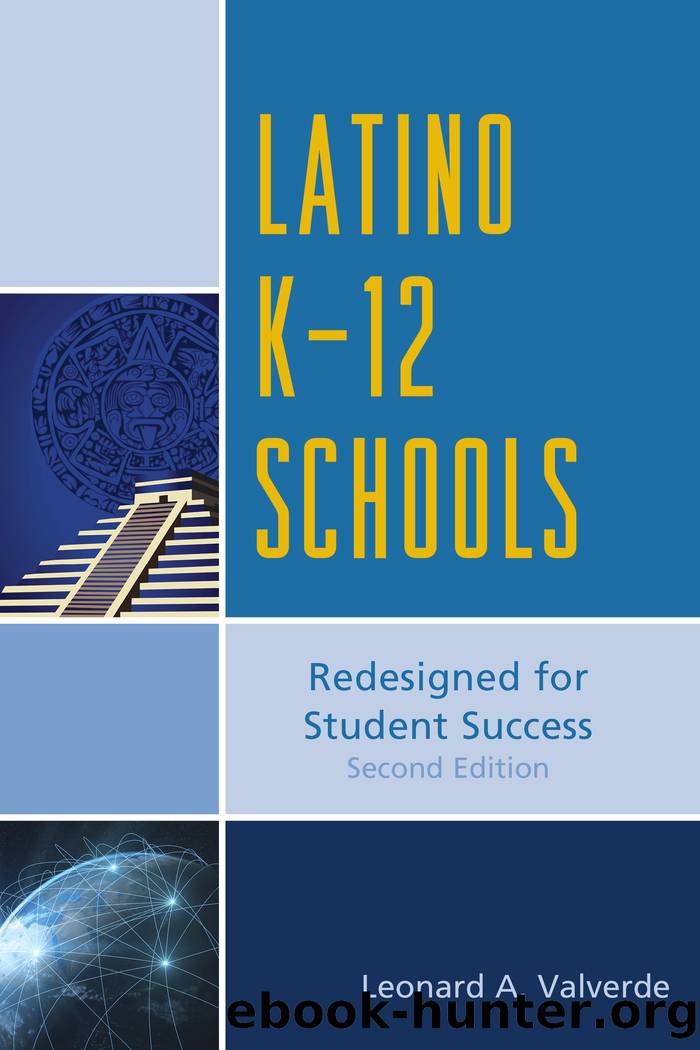Latino K-12 Schools by Valverde Leonard A.;

Author:Valverde, Leonard A.;
Language: eng
Format: epub
Tags: undefined
Publisher: Rowman & Littlefield Publishers
Published: 2012-08-15T00:00:00+00:00
From Changing Thoughts to Different Behaviors
Developing teachersâ cultural knowledge alone is not enough to change practice, as a recent program evaluation revealed. After twenty years of a Texas school districtâs efforts to help educators learn about and serve a community that was quickly shifting from predominantly white to a diverse population, findings revealed that practice not only remained the same but also teachers continued to openly express deficit beliefs about the CLED students and families they served (Ezzani, 2013). For change in teacher practice to occur, both beliefs and behavior have to be addressed (Guerra and Nelson, 2009). During professional learning experiences, beliefs and assumptions should be brought to consciousness, and the deep structures supporting behaviors should be examined (Bocchino 1993; Cochran-Smith, 2004; Pollack, 2012). As Shulman (1999, 3) explains: âThe inside beliefs and understandings must come out, and only then can something outside get in. . . . The first influence on new learning is not what teachers do pedagogically but the learning thatâs already inside the learner.â
Personal beliefs strongly influence teachersâ knowledge and behavior (Pohan, 1996; 2001). Exposed to new information, teachersâ personal beliefs unconsciously filter the information to make sense of it. While doing so, they often reject or modify aspects of the information that do not fit their beliefs (Bandura, 2001). For example, a teacher attends a district workshop on using a research-based math program that has been proven to be effective, particularly with CLED students. He/she tries it but fails to get similar results. Believing some children cannot learn because they come with internal deficiencies that interfere with learning, he/she selects only the seatwork assignments to use and not the entire instructional program.
Unconsciously choosing to implement the math program not as the workshop trainer instructed but as filtered by his/her personal beliefs (Pohan, 1996), these beliefs are reinforced when school accountability data indicates her or his students made little to no progress. She or he views students at fault for this underachievement because in her or his eyes the math program was implemented. Without addressing the underlying deficit beliefs influencing teachersâ behavior like in this example, providing quality, research-based professional development does little to change practice once educators return to classrooms and close their doors.
Download
This site does not store any files on its server. We only index and link to content provided by other sites. Please contact the content providers to delete copyright contents if any and email us, we'll remove relevant links or contents immediately.
The Art of Coaching Workbook by Elena Aguilar(50168)
Trainspotting by Irvine Welsh(21078)
Twilight of the Idols With the Antichrist and Ecce Homo by Friedrich Nietzsche(18324)
Fangirl by Rainbow Rowell(8819)
Periodization Training for Sports by Tudor Bompa(7947)
Change Your Questions, Change Your Life by Marilee Adams(7405)
This Is How You Lose Her by Junot Diaz(6477)
Asking the Right Questions: A Guide to Critical Thinking by M. Neil Browne & Stuart M. Keeley(5389)
Grit by Angela Duckworth(5322)
Red Sparrow by Jason Matthews(5230)
Paper Towns by Green John(4826)
Room 212 by Kate Stewart(4768)
Ken Follett - World without end by Ken Follett(4468)
The Sports Rules Book by Human Kinetics(4099)
Housekeeping by Marilynne Robinson(4085)
Double Down (Diary of a Wimpy Kid Book 11) by Jeff Kinney(3960)
Papillon (English) by Henri Charrière(3942)
The Motorcycle Diaries by Ernesto Che Guevara(3804)
Exercise Technique Manual for Resistance Training by National Strength & Conditioning Association(3800)
